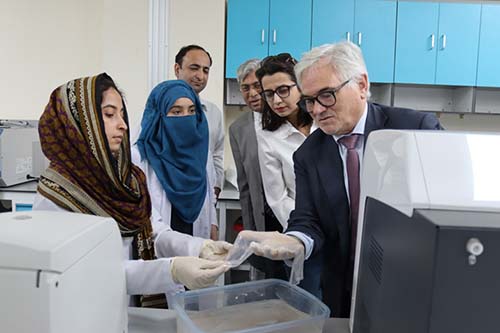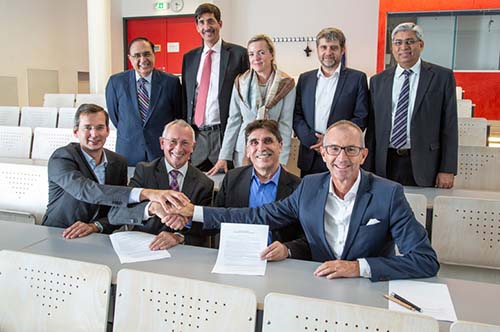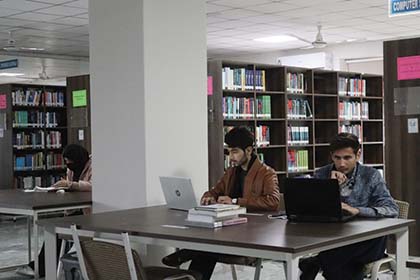“Tell me and I forget, teach me and I may remember, involve me and I learn.”
— BENJAMIN FRANKLIN
There is no denying the fact that education is a key driver of economic growth and development. An educated workforce is essential for a strong economy, as it helps to increase productivity and innovation.
What is meant by a well-educated workforce is a pertinent question that needs to be addressed in the backdrop of the 21st-century job market. Does an academic degree that showcases the number of years and clearance of a standardized examination of an individual equal to the well-educated workforce? The answer is easy, and it is “no.” The prevailing education system is not designed to foster creativity, critical thinking, or problem-solving skills, which are increasingly important in today’s rapidly changing world and are the prime skill requirements of the 21st century.
Sir Ken Robinson, a renowned educator, author, and speaker, known for his work in promoting a new paradigm for education, argues that the traditional education system, which is based on a “factory model” of standardized testing and rote-learning, is outdated and needs to be reformed to meet the needs of 21st-century learners.
The world is changing at a pace never experienced before. The job market is no longer limited to geographical boundaries. A globalized job market that is welcoming to a diverse workforce is simultaneously ruthless in scrutiny and selection of its workforce based on the required skill set. The multitude of opportunities, growing global industry, and unceasing demand for “the right employee” – the skilled individuals is the new reality of the 21st century.
The dilemma of developing countries is that they have a growing population, primarily in the youth group. Yet, their higher education sector is not adequately preparing graduates for the workforce of the global job market. Various factors can contribute to this inability to produce market-ready graduates, such as outdated curriculum, lack of provision of necessary skills required in their respective field, and lack of practice of on-the-job training.
The world is witnessing an overall shift that has ensued a fundamental change in how education is conceptualized, delivered, and experienced. Hence, an essential need for revision of the existing educational models such as “The Fachhochschule.”
Fachhochschule is a German term that translates to “University of Applied Sciences” in English. These technology institutions provide higher education and professional training in fields such as engineering, business, and design, with a greater focus on practical and hands-on learning that is, applying theoretical concepts to real-world problems.

Universities of Applied Sciences, or Fachhochschulen, are well-positioned to play a significant role in shaping the future economy. They are well-suited to preparing students for the demands of the modern workforce because of their mode of teaching and practice-based education of students. Universities of Applied Sciences’ vital role in the future economy is expected to be achieved by not only providing students with the skills and knowledge they need to succeed in today’s rapidly changing job market but also fostering strong partnerships between education and industry.
Pakistan’s severe deficiency in skilled and trained workforce resulted in a weak economy and low exports. The issue of high unemployment rates among graduates in Pakistan is a complex problem, with multiple factors contributing at various levels to its severity. Among the many, one of the critical factors is the mismatch between graduates’ skills and employers’ needs. Pakistan’s need for skilled workers in several industries to attain economic growth is undeniable. The demand for qualified human resources can be attributed to a need for more investment in education, training, and even limited job opportunities in some fields. The Government has finally shifted its focus to improving the education system to produce highly competent and skilled graduates.
In response to the changing global dynamics and the demand for market-ready human resources, Dr. Atta-ur-Rahman and his team designed a modified model of the German Fachhochschule “University of Applied Sciences.” Dr. Atta-ur-Rahman is well known for his tremendous efforts to improve the quality and accessibility of higher education through reforms and international collaborations. Dr. Rehman is an unwavering advocate of the importance of science and technology for the country’s development and has played a crucial role in promoting science education in Pakistan.
Dr. Rahman’s quote, “Skilling Pakistan is the most pressing need of the hour. Human resource development and skill training in tandem are the essential elements to boost the key growth sectors such as manufacturing, information and communication technologies, medical technologies, core engineering areas, as well as the construction field” is the central idea behind the establishment of Pak-Austria Fachhochschule: Institute of Applied Sciences and Technology.
Pak-Austria Fachhochschule: Institute of Applied Science and Technology (PAF-IAST) is an initiative of the Government of Khyber-Pakhtunkhwa. It is a collaborative public sector venture with the premier Austrian and Chinese universities. PAF-IAST has a purpose-built campus, with state-of-the-art facilities for interactive learning through smart classrooms and advanced laboratory equipment, established at Mang, Haripur.

The course curricula are augmented with lectures and seminars delivered by industry professionals and experts with vast experience. All academic programmes curricula have detailed skill mapping in all courses. The skill maps are developed in collaboration with the respective industries during the special meetings to record the industry needs and incorporate them into the academic portfolio of the degree programs. Similarly, the laboratory work is strictly planned to include an application-oriented approach.

The ingenuity of the revised Fachhochschule model at PAF-IAST is the mandatory 500 hours industry training requirement for undergraduate students. Students are required to undergo hands-on industry training during their studies at PAF-IAST. Training in the relevant industry starts as early as the first year of their undergraduate degree. It is diligently supervised by the student’s academic supervisor at the university in coordination with the student’s industry supervisor.
The academic programmes are delivered by highly qualified, 100% Ph.D. faculty trained by foreign partners. Besides the professors in academic programs, a new concept of ‘Professors of Practice’ has been introduced to onboard the applied industrial approach in the classrooms. It is pivotal to building and promoting linkage with the industry.
Professors of Practice is one of many novel ideas introduced in the teaching domain at PAF-IAST. The Institute has pioneered the unique concept of a faculty industry placement program. In this first-of-its-kind initiative in Pakistan, PAF-IAST will have its faculty members work in the partner industry for a short-term summer placement programme. Faculty members will have to get hands-on experience in the industry of their academic specialization to ensure that the faculty can further align their teaching practices with the real-life needs of the industry.
In addition, research centers in selected applied fields encompassing railway engineering, mineral resource engineering, food processing & packaging technologies, and artificial intelligence are being established in collaboration with leading Chinese universities. Three of the centers, namely the “Sino-Pak Center for Artificial Intelligence,” “The center of Excellence in Transportation and Railway Engineering (COETRE),” and “The Center for Mineral Resource Engineering” have already started functioning in state-of-the-art facilities and with teams of highly qualified Ph.D. faculty and industrial experts. All the research centers are founded on the triple helix model of bringing together academia, industry, and Pakistan state bodies to achieve a holistic strengthening approach to these respective domains of specialization.
The centerpiece of PAF-IAST is the Technology Park, built to cultivate innovation and to promote new start-up companies with close linkages with the Austrian, Chinese and Pakistani industries. Emphasis is given to applied research of industrial importance. The aim is to foster the development and manufacture of innovative products both for the local market of Pakistan and for export.
PAF-IAST has expanded its faculties and departments over the last three years with the expanding needs of the technical, industrial, and educational sectors. Starting with only five programmes in 2020, the Institute currently offered Forty-four programmes under various departments in 2022. Each programme is developed in line with HEC guidelines and industrial needs, mainly focusing on enhancing students’ skills.
Aristotle’s quote that “for the things we have to learn before we can do them, we learn by doing them,” beautifully captures the concept of Pak-Austria Fachhochschule: Institute of Applied Science and Technology.

